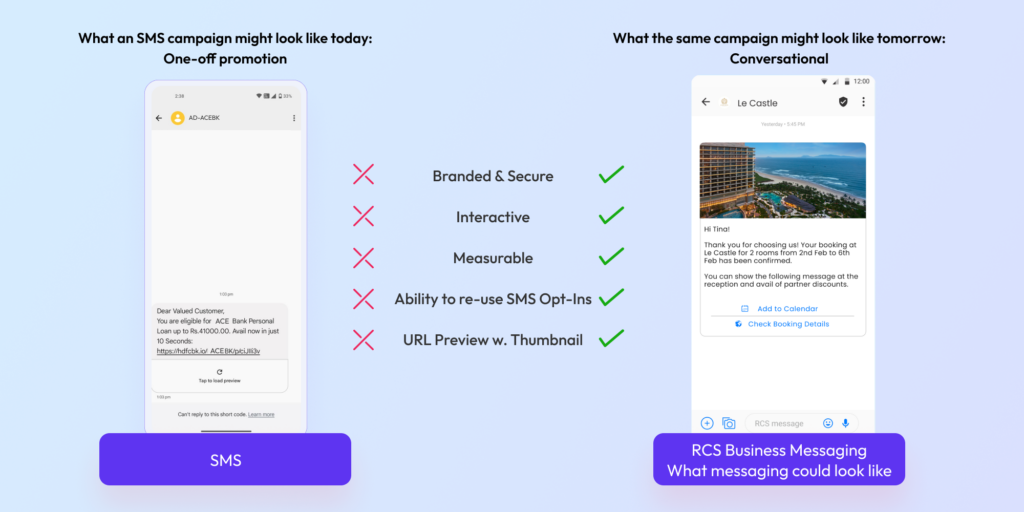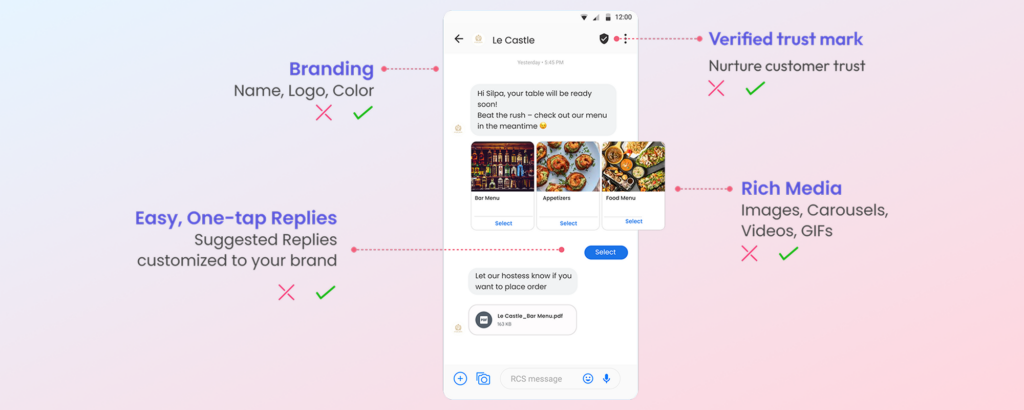Apple’s integration of RCS messaging with its iOS 18 rollout marked a watershed moment for business communication. This wasn’t just another technical update—it was an acknowledgment that Rich Communication Services (RCS) is now an indispensable messaging standard. As RCS user base surges past 1 billion monthly active users and races toward an anticipated 3 billion by the end of 2025, it’s not just changing business-to-consumer messaging—it’s completely transforming it.
Yet the true significance of RCS extends far beyond these numbers. Imagine a world where your customers can schedule appointments, make purchases, and receive personalized support—all within their native messaging app. This isn’t a future projection; it’s happening now through RCS Business Messaging (RBM), and it’s fundamentally altering how consumers expect to interact with brands.
The Evolution from SMS to Rich Communication Services
The shift from SMS to RCS represents a quantum leap in messaging capabilities. While SMS has reliably delivered text messages for decades, it’s akin to using a rotary phone in a smartphone world. Each plain-text SMS message is confined to 160 characters, devoid of rich media, and offers no way to verify if a business sender is legitimate. These limitations have created a growing disconnect between what businesses want to communicate and what they actually can communicate.
RCS bridges this gap by introducing a suite of advanced capabilities that align with modern consumer expectations. This evolution is particularly significant as major players like Apple join the RCS ecosystem, signaling a new era in messaging standardization. The protocol’s ability to support rich media, interactive elements, and verified business profiles is creating a more engaging and trustworthy messaging environment.
Enhanced Personalization: The New Standard in Customer Communication
Hyper-Personalized Messaging Capabilities
The era of one-size-fits-all messaging is over. RCS has revolutionized the concept of personalized communication by enabling brands to craft messages that resonate with individual consumers on a deeply personal level. Through sophisticated data analysis and user behavior tracking, businesses can now understand their customers’ preferences, purchase patterns, and interaction history in unprecedented detail.
This wealth of information allows companies to create highly targeted communications that feel less like marketing messages and more like personal conversations. For instance, a retail brand can now send personalized product recommendations based not just on previous purchases, but also on browsing behavior, seasonal preferences, and even local weather conditions.
This level of personalization has proven to significantly impact consumer engagement, with businesses reporting higher conversion rates compared to traditional SMS campaigns.

Rich Media Integration: Beyond Text-Based Communication
The integration of multimedia elements in RCS messages has transformed simple text exchanges into immersive brand experiences. High-resolution images and videos allow consumers to preview products directly within their messaging app, while interactive carousels enable them to browse multiple items without leaving the conversation. This rich media capability isn’t just about aesthetics—it’s about providing consumers with the information they need to make informed decisions quickly and efficiently.
Consider a scenario where a travel company sends an RCS message about vacation packages. Instead of a simple text description, they can include virtual tours of destinations, interactive maps, and real-time pricing updates. This rich content helps consumers visualize their potential purchase and makes the decision-making process more engaging and informative.
The Rise of Consumer Expectations in the Age of Immediate Gratification
The New Normal: Real-Time Response and Resolution
Modern consumers have developed an expectation for immediate gratification in their brand interactions, largely driven by their experiences with social media and instant messaging platforms. RCS meets this demand through sophisticated automation and AI integration. When a customer reaches out with a query, they expect—and often receive—an instant response, even outside of regular business hours.
This shift in expectations has profound implications for businesses. Companies must now maintain a constant state of readiness to engage with customers, whether through AI-powered chatbots handling routine inquiries or smart routing systems that ensure urgent matters reach human agents quickly. The impact of meeting these expectations is significant—research shows that 78% of consumers are more likely to remain loyal to brands that provide immediate responses through messaging platforms.
Conversational Commerce: The Future of Business Transactions
The emergence of conversational commerce through RCS represents a fundamental shift in how consumers interact with businesses. Rather than navigating through websites or apps, customers can now complete entire transactions within their messaging interface. This seamless integration of commerce into conversation feels more natural and convenient for consumers, leading to higher engagement and conversion rates.
AI Integration: The Intelligence Behind RCS Messaging
The integration of AI with RCS is revolutionizing how businesses handle customer interactions at scale. Unlike traditional chatbots that often frustrate customers with rigid, preprogrammed responses, AI-powered RCS messaging employs sophisticated natural language processing to understand context, sentiment, and intent. This enables businesses to maintain personalized conversations with thousands of customers simultaneously while ensuring each interaction feels natural and meaningful.
Consider a global airline using AI-enhanced RCS messaging. When a flight is delayed, the system doesn’t just send a generic notification. Instead, it analyzes each passenger’s situation—their connection times, loyalty status, and previous travel patterns—to provide personalized solutions. Business travelers might receive priority rebooking options, while leisure travelers could get suggestions for airport lounges or local attractions. This level of intelligent, contextual communication transforms a potentially negative experience into an opportunity for enhanced customer service.
The Role of Predictive Analytics
AI’s impact extends beyond reactive customer service into predictive engagement. By analyzing patterns in customer behavior, AI systems can anticipate needs and initiate proactive communications. A telecommunications provider, for example, might detect unusual usage patterns and send an RCS message offering an optimized plan before the customer experiences bill shock. This predictive capability helps businesses shift from problem-solving to problem prevention, significantly improving customer satisfaction and loyalty.
Impact on Consumer Loyalty: Building Stronger Brand Relationships
The advent of RCS is fundamentally changing how brands build and maintain customer loyalty. Traditional loyalty programs relied heavily on transactional relationships—points, discounts, and rewards. However, RCS enables a more sophisticated approach based on meaningful engagement and personalized experiences.

The Trust Factor
Verified sender profiles in RCS messaging play a crucial role in building trust. When customers receive messages from authenticated business profiles, complete with brand logos and verification badges, it creates an immediate sense of legitimacy. This trust foundation is particularly valuable in an era where consumers are increasingly wary of digital fraud and scams.
From Transactions to Relationships
Leading brands are leveraging RCS to create what might be called “conversational loyalty.” A luxury retailer, for instance, might use RCS to provide their high-value customers with a personal shopping experience directly through messaging. Customers can browse new collections, get styling advice, and make purchases through rich, interactive messages that feel more like a conversation with a trusted advisor than a sales interaction.
The Local Connection
RCS is particularly effective in strengthening local market connections. National brands can use location-aware messaging to organize local events, support community initiatives, and provide region-specific offers. This capability helps global brands maintain the personal touch of a local business while operating at scale.
SMS vs RCS: A Clear Winner for Business Messaging
As we look toward the future of RCS, several key trends are emerging that will shape its evolution and impact on business communication.
Cross-Platform Integration
With Apple’s adoption of RCS, we’re moving toward a truly unified messaging ecosystem. This consolidation will eliminate the fragmentation that has historically complicated business messaging strategies. Brands can now develop consistent messaging experiences that work seamlessly across all devices and platforms, significantly improving campaign efficiency and effectiveness.
Advanced Commerce Capabilities
The next phase of RCS will likely see enhanced commerce capabilities integrated directly into messaging flows. Imagine customers being able to not just browse products but complete secure transactions, manage subscriptions, and handle returns—all within their messaging app. This seamless integration of commerce and communication will further blur the lines between messaging and e-commerce platforms.
Privacy-First Features
As data privacy regulations continue to evolve, RCS is positioned to offer enhanced privacy features while maintaining its rich functionality. Future developments will likely include enhanced end-to-end encryption options, granular privacy controls, and transparent data usage policies that give consumers more control over their messaging experiences.
IoT Integration
The integration of RCS with Internet of Things (IoT) devices opens up exciting possibilities for automated, context-aware messaging. Smart home devices could trigger relevant RCS messages, such as a connected appliance automatically initiating a service request through a verified business messaging channel.
Enhanced Analytics and Measurement
The future of RCS will bring more sophisticated analytics capabilities, allowing businesses to measure the full impact of their messaging strategies. Advanced metrics will go beyond open rates and click-throughs to measure engagement quality, conversation sentiment, and customer satisfaction in real-time.
Looking Ahead: The Future of RCS and Consumer Behavior
As RCS continues to evolve, its influence on consumer behavior will only deepen. The protocol’s ability to deliver rich, interactive, and personalized experiences is setting new standards for business communication. For telecommunications providers, aggregators, ISVs, and businesses, adopting RCS isn’t just about staying current—it’s about preparing for a future where rich messaging is the fundamental expectation of every consumer interaction.
By embracing RCS and its capabilities, you can be at the forefront of the messaging evolution, ready to meet the sophisticated demands of tomorrow’s consumers. The future of business messaging is rich, interactive, and increasingly intelligent—and it’s being shaped by RCS today.





